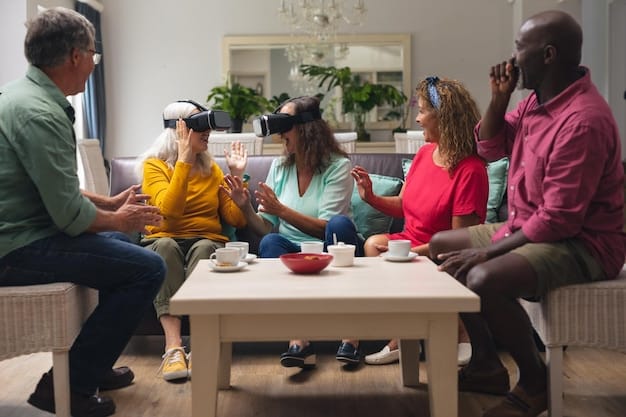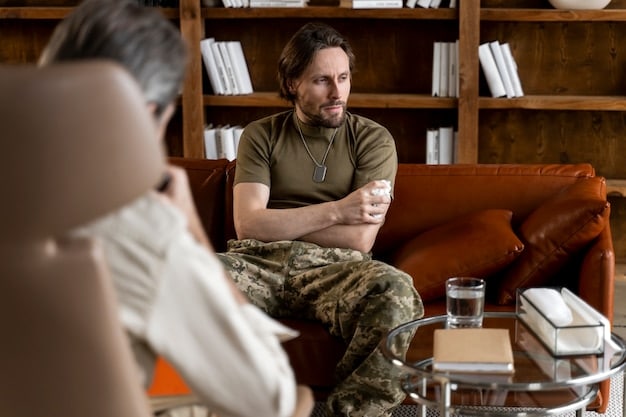Emotional Resilience for Veterans: Resources & Strategies for Transition

Emotional Resilience for Veterans: Resources and Strategies for a Successful Transition focuses on providing veterans with the tools and support needed to navigate the emotional challenges of transitioning to civilian life, enhancing their well-being and long-term success.
Navigating the transition from military to civilian life can present significant emotional challenges. That’s why understanding and building emotional resilience for veterans: resources and strategies for a successful transition is crucial for long-term well-being.
Understanding Emotional Resilience in Veterans
Emotional resilience is the ability to bounce back from adversity, stress, and trauma. For veterans, this skill is especially vital as they often face unique challenges related to their service and transition back into civilian society.
Resilience isn’t about avoiding negative emotions but rather about managing them effectively and maintaining a positive outlook despite difficult experiences. It’s a learned skill that can be developed and strengthened over time.
The Importance of Emotional Resilience
Emotional resilience is important for veterans’ mental health, enabling them to cope with challenges like post-traumatic stress disorder (PTSD), anxiety, and depression. Strong emotional resilience supports overall well-being and aids in forming healthy relationships.
It helps veterans successfully integrate into civilian life by fostering adaptability, problem-solving skills, and a sense of purpose. This, in turn, contributes to a fulfilling and meaningful post-service existence.
- Improved Mental Health: Resilience reduces the risk and impact of mental health issues.
- Successful Transition: Helps veterans adapt to civilian life’s demands and changes.
- Enhanced Relationships: Fosters healthier connections with family, friends, and the community.
In conclusion, emotional resilience plays a crucial role in veterans’ holistic well-being during transition. Improving resilience helps them tackle challenges, build connections, and succeed in civilian life.
Common Challenges Affecting Veteran’s Emotional Well-being
Veterans may encounter several emotional struggles during their journey back to civilian life. Many face mental health issues, relationship difficulties, and a sense of disconnect from their previous military identity.
These challenges can significantly impact their overall well-being, making it essential for veterans to seek support and develop coping strategies.
Mental Health Struggles
Veterans are often at a higher risk of developing mental health conditions such as PTSD, depression, and anxiety. These conditions can arise from experiences during deployment, exposure to trauma, or the stress of transitioning back into civilian life.
Untreated mental health issues can lead to further difficulties in relationships, employment, and overall quality of life. Seeking professional help and utilizing available resources are crucial steps to address these struggles.
Relationship Problems
The transition from military to civilian life can strain relationships due to changes in routine, communication difficulties, and the emotional toll of deployment.
Veterans may struggle to reconnect with their families, rebuild trust, or adapt to new roles and responsibilities within the household. Open communication, couples counseling, and support groups can help navigate these challenges and strengthen relationships.
- PTSD: High risk of developing Post-Traumatic Stress Disorder.
- Depression: Elevated rates of depressive disorders.
- Substance Abuse: Increased likelihood of substance dependency.
Veterans often face significant emotional and mental health challenges when adjusting to civilian life. Addressing mental health, strengthening relationships, and redefining their identity are critical to successful reintegration and overall well-being.

Effective Strategies to Build Emotional Resilience
Building emotional resilience involves developing actionable strategies to cope with stress, manage emotions, and foster a positive outlook. These skills enable veterans to overcome challenges and thrive in civilian life.
Such strategies encompass self-care practices, mindfulness, social support, and professional assistance to address mental health conditions and promote overall well-being.
Self-Care Practices
Engaging in regular self-care activities is crucial for maintaining emotional well-being. These practices can include physical exercise, healthy eating, adequate sleep, and hobbies or interests that bring joy and relaxation.
Taking time for self-care helps reduce stress, improve mood, and enhance overall resilience, making veterans better equipped to handle life’s demands.
Mindfulness and Meditation
Practicing mindfulness and meditation can help veterans become more aware of their thoughts, feelings, and physical sensations in the present moment. Mindfulness techniques can reduce anxiety, improve focus, and cultivate a sense of inner peace.
Regular meditation practice can also enhance emotional regulation skills, enabling veterans to respond to stress more effectively and maintain a balanced perspective.
- Exercise Regularly: Promotes physical and mental health.
- Practice Mindfulness: Helps stay present and manage stress.
- Seek Social Support: Connect with others for emotional support.
Employing these strategies can significantly bolster veterans’ ability to navigate civilian life. Self-care promotes overall well-being, mindfulness enhances emotional regulation, and strong social connections offer necessary support and camaraderie.
Resources Available to Support Veterans
Numerous resources are available to support veterans in their journey toward emotional and mental well-being. These resources encompass government programs, non-profit organizations, and community-based initiatives.
Accessing these supportive networks can provide veterans with the tools, guidance, and assistance they need to navigate challenges and thrive in civilian life.

Government Programs and Services
The Department of Veterans Affairs (VA) offers a wide range of programs and services to support veterans’ physical and mental health. These include medical care, counseling, vocational rehabilitation, and housing assistance.
The VA also provides specialized programs for veterans with PTSD, substance abuse issues, and other mental health conditions. Accessing these government-supported services can provide comprehensive care and support to veterans in need.
Non-Profit Organizations
Numerous non-profit organizations are dedicated to supporting veterans and their families. These organizations offer a variety of services, such as peer support groups, mental health counseling, financial assistance, and recreational activities.
Non-profit groups often collaborate with government agencies and community partners to provide a holistic approach to veteran care. Engaging with these organizations can offer veterans a sense of community, belonging, and access to additional resources.
- VA Healthcare: Comprehensive medical and mental health services.
- Veterans Crisis Line: Immediate support for veterans in distress.
- Local Support Groups: Community-based assistance and camaraderie.
Veterans can benefit immensely from these resources as they navigate the challenges of transitioning to civilian life. Utilizing government programs and engaging with non-profit organizations can supply the support, tools, and community needed for a fulfilling and successful post-military existence.
Building a Strong Support Network
A robust support network is critical for veterans transitioning to civilian life. Connecting with family, friends, peers, and the community can provide emotional support, reduce feelings of isolation, and enhance overall well-being.
Cultivating meaningful relationships and support channels helps veterans navigate challenges, build resilience, and integrate seamlessly into society. Support networks alleviate isolation and promote adaptation in civilian life.
Family and Friends
Reconnecting with family and friends can provide veterans with a sense of belonging, love, and support. Family members can offer a stable base and act as allies in navigating the transition back to civilian life.
Open communication, shared activities, and quality time spent together can strengthen these relationships, providing veterans with a vital source of emotional comfort and assistance. Communication fosters stronger family connections after service.
Peer Support Groups
Joining peer support groups connects veterans with others who share similar experiences and challenges. These groups offer a safe space to share feelings, offer mutual support, and learn coping strategies from individuals who truly understand.
Peer support can reduce feelings of isolation, enhance self-esteem, and provide veterans with a sense of camaraderie and belonging. Such groups foster a sense of belonging, essential for veteran well-being.
- Reconnect with Family: Strengthen familial bonds through open communication.
- Join Support Groups: Share experiences and find understanding among peers.
- Engage in Community Activities: Integrate socially and build new connections.
Establishing and nurturing such connections builds resilience, improves mental health, and fosters a successful transition. Supportive relationships significantly enhance the well-being and civilian integration of veterans.
Overcoming Stigma and Seeking Help
One significant hurdle for veterans is the stigma associated with mental health issues. Overcoming this stigma and encouraging veterans to seek help when needed is critical for their emotional well-being.
Education, awareness campaigns, and supportive communities can normalize mental health care, reducing the shame and fear that often prevent veterans from reaching out for assistance. Breaking down stigma supports reaching out for timely help.
Educating About Mental Health
Providing education about mental health conditions and treatment options can help dispel myths and misconceptions surrounding these issues. By learning more about mental health, veterans, their families, and communities can better understand the challenges veterans face.
Education can also help individuals recognize the signs and symptoms of mental health conditions, enabling them to seek appropriate support and intervention when needed. Education promotes informed perspectives on mental wellness.
Normalizing Mental Health Care
Creating a culture that normalizes mental health care can reduce the stigma associated with seeking help. Public figures, community leaders, and veterans themselves can play a role in sharing personal experiences and advocating for mental health support.
By highlighting the effectiveness of mental health treatments and promoting open discussions, we can help veterans feel more comfortable seeking assistance and prioritizing their emotional well-being. By normalizing care, support becomes more accessible.
- Promote Education: Increased understanding reduces stigma and fear.
- Encourage Open Dialogue: Open discussions normalize mental health challenges.
- Support Healthcare Access: Ensure easy access to mental health services.
Confronting stigma, actively promoting understanding, and ensuring accessible resources is vital. Through these combined efforts, veterans will find greater comfort in embracing mental wellness and seeking timely support, leading to improved holistic well-being.
| Key Point | Brief Description |
|---|---|
| 💪 Building Resilience | Strategies for managing stress and emotional well-being. |
| 🫂 Support Networks | Importance of connecting with family, friends, and peers. |
| ⚕️ Seeking Help | Overcoming stigma and finding mental health resources. |
| 🌟 Emotional Well-being | Focus on improving mental health and overall life quality. |
Frequently Asked Questions (FAQ)
▼
Emotional resilience is the ability to adapt and bounce back from stressful situations, trauma, and adversity. It involves managing emotions effectively and maintaining a positive outlook.
▼
Veterans often face unique challenges such as PTSD and difficulties readjusting to civilian life. Emotional resilience helps them cope with these challenges, promoting mental and emotional well-being.
▼
The Department of Veterans Affairs (VA) provides various mental health services. Non-profit organizations also offer support groups, counseling, and other resources to support veterans’ mental health needs.
▼
Veterans can connect with family, friends, peer support groups, and community organizations. Engaging in social activities and maintaining open communication allows veterans to strengthen these essential relationships.
▼
Education, open discussions, and sharing personal stories help reduce stigma. Normalizing mental health care and advocating for support services can make veterans feel more comfortable seeking help.
Conclusion
In conclusion, enhancing





